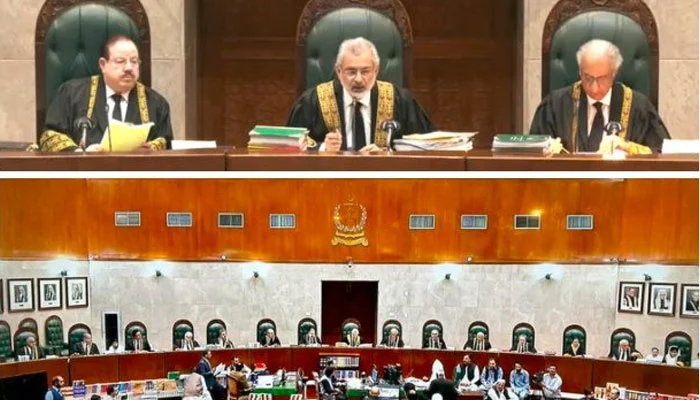In a historic ruling, the Full Court Bench of the Supreme Court of Pakistan rejected all petitions against the Supreme Court (Practice and Procedure) Act, acknowledging Parliament’s constitutional authority. The Practice and Procedure Act was upheld as valid, cementing its status as law in accordance with the constitution. Chief Justice, during the verdict announcement, emphasized that past precedents would not dictate the application of this law. The concept of the Master of the Roster was dismantled, conferring the authority to constitute benches, defer proceedings, and issue suo motu notices solely to the 3-member Judges’ Committee, as per Article 184/3. The right to appeal was preserved, with 9 judges supporting it and 6 opposing.
The Bench’s decision resonates with the principles of direct and immediate judicial review, as it emphasized that the Supreme Court is not an adversary of Parliament. It is a move towards reinforcing the rights of the people. The court cautioned against negative perceptions of each other’s institutions, promoting the principles of live and let live. The burden of proof now lies on those challenging the law, requiring them to demonstrate its inconsistency with the constitution and legal norms. Parliament had the option to advance further, but it entrusted the judiciary, upholding the dignity of the Supreme Court and avoiding a clash between constitutional bodies.
The 15-member Full Court Bench, after a thorough hearing, rendered a decision directly impacting the country’s legal landscape. The concise 4-page verdict, released after intense deliberation, established the law’s constitutional legitimacy. Among the 15 judges, Justices Aejaz Afzal, Manzoor Ahmad Malik, Ayesha A. Malik, Mazhar Alam Khan Miankhel, and Shahid Waheed opposed the law, while the remaining 10 upheld it. Notably, Chief Justice Faez Isa, Justice Sardar Tariq Masood, and Justice Mansoor Ali Shah were part of the minority.
During the proceedings, Chief Justice emphasized that the Parliament respected the Supreme Court by enacting legislation. He questioned whether the Supreme Court could create powers it didn’t have previously. When arbitrariness prevailed, and a dictator usurped rights, silence was maintained; however, now when Parliament legislates, questions arise. The Supreme Court was given additional powers but would abolish them if misused, similar to the parallel judicial system created in the past. Justices Mansoor Ali Shah and Ayesha A. Malik highlighted the importance of lawmaking, asserting that the primary source was Parliament. They emphasized that all laws derived their authority from the laws Parliament made, granting them superiority over other legislation. The Attorney General defended the Supreme Court (Practice and Procedure) Act 2023, stating that Parliament had the jurisdiction to legislate on the Supreme Court’s practices and procedures. He asserted that direct judicial review had harmed the country previously. He referred to the Quran, emphasizing consultation and urged acceptance of a law made through constitutional means.
This landmark decision not only strengthens Pakistan’s constitutional framework but also serves as a testament to the country’s commitment to the rule of law, balancing powers between the judiciary and the legislature.



